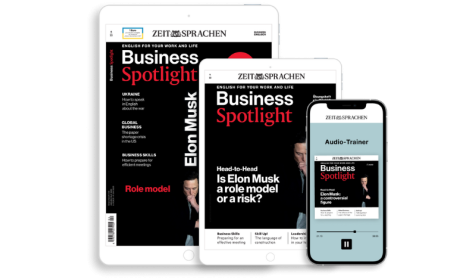In the exercises below, we look at two tenses that are often confused: the present simple and the present continuous. If you’re unsure about the rules, you can read a short summary in the white box below.
Present simple or present continuous? Some explanations:
Use the present simple…
1. For habits and routines, often with expressions that refer to how frequently something happens:
- My boss usually comes to this conference.
- I come every year.
- My boss always returns with business cardVisitenkartebusiness cards.
2. For facts and general truths:
- Some of the talks are really inspiring.
- Is this your first time at the ICP?
- They provide a great opportunity for networking.
- So you’re from Boston?
- I live in London.
- We have an office in the City.
3. For scheduledanberaumtscheduled events in the future:
- The next talk starts in five minutes.
Use the present continuous…
1. For actions happening now or soon:
- Is anyone sitting here?
- I’m having a great time.
- We’re thinking of to relocateumziehenrelocating to Germany.
2. For temporary and changing situations:
- I’m to take sth. onetw. übernehmentaking on more and more of his duties.
3. For fixed arrangements in the future:
- He’s retiring next year.
State verbs
state verbZustandsverbState verbs (also called “stative verbs”) describe thoughts and opinions, feelings, senses, possession and existence, but not actions. They are normally used only in the simple form, not the continuous:
- Yeah, I know.
Other common state verbs include:
- believe, think, understand
- like, hate, prefer
- see, hear, smell
- belong, have, be
Some verbs can describe a state (simple form only) as well as an action (continuous form possible):
- What do you think of the conference? (= What’s your opinion?)
- We’re thinking of relocating to Germany. (= We are considering the advantages and disadvantages.)
- We have an office in the City. (= The office is located in the City.)
- I’m having a great time. (= I’m enjoying what I am doing right now.)
1. Simple or continuous?
1. Simple or continuous?
EASY
2. State or action?
2. State or action?
MEDIUM
3. Rules to remember
3. Rules to remember
ADVANCED
Neugierig auf mehr?
Dann nutzen Sie die Möglichkeit und stellen Sie sich Ihr optimales Abo ganz nach Ihren Wünschen zusammen.



